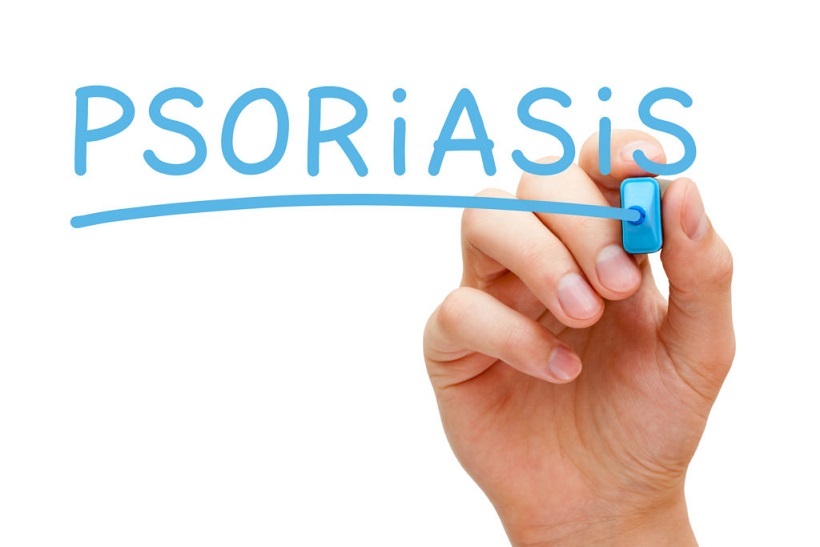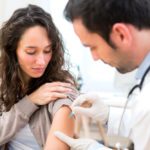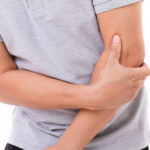Psoriasis – What is it?
Psoriasis is a non-infectious skin disease in which the skin cells renew themselves much faster than in normal skin.
As a rule, our skin renews itself about once a month. During this process, completely new skin cells are created. The old and damaged cells are simply rejected and fall off. A healthy person without psoriasis usually does not notice this at all.
Psoriasis leads to a thick, spotty, red rash with silvery white scales. The most common form is called plaque psoriasis.
Psoriasis can occur anywhere on the body, but is most common on the scalp, elbows, knees and lower back.
Children can get psoriasis, but psoriasis is more common in adults.
What happens if I have psoriasis on my skin?
To understand what happens with psoriasis, we need to look closely at the top layer of the skin (epidermis):
While the renewal cycle for healthy skin is 26 to 28 days, this process is shortened to six to seven days for psoriasis patients.
The result is an overproduction of skin cells that our body cannot cope with. This is why the cells accumulate more and more on the surface of the skin, which in turn leads to severe scaling and keratinisation.
At the same time, small blood vessels form underneath, which lead to the typical, heavily reddened areas of skin, as well as inflammation.
Symptoms of psoriasis
In the case of psoriasis, however, the body produces so many new skin cells within a few days that it no longer knows what to do with them. This disrupts the natural regeneration process of the skin and keratinized skin cells accumulate more and more on the skin surface.
This leads to the typical symptoms of psoriasis:
- dry skin,
- damaged and red spots on the skin,
- chronic itching.
When psoriasis begins, some red bumps may appear on the skin. These can get bigger and thicker and then form scales.
The patches may merge together and cover large parts of the body. The rash can be itchy and uncomfortable, and it can easily start bleeding if you rub or scratch it.
Is psoriasis contagious?
Psoriasis is a chronic skin disease in which the skin forms silvery-white scales and is inflamed and reddened.
What many people unfortunately still do not know: psoriasis is not contagious!
Effects of psoriasis – psychological and physical
The effects of psoriasis, especially the psychological strain, should not be neglected. According to a study, those affected assess their quality of life as lower than those affected by cancer or arthritis, although in many cases the disease “only” appears externally.
The situation is similar for quality of life with regard to physical stress. Type 2 diabetes, depression and cancer have less of a negative influence on quality of life than psoriasis.
In 2014, the World Health Organization (WHO) therefore listed psoriasis as the fifth non-infectious disease on a list of diseases requiring special support and classified it as serious.
The role of the immune system in psoriasis
Psoriasis is one of the autoimmune diseases. That is why the cause of the malfunctioning is in the immune system. The immune system is the natural protective apparatus of the human body and is responsible for maintaining our health.
If the immune system detects a disruptive factor (viruses, bacteria, injuries, etc.), the natural body defence system will start to work until the problem is eliminated. With psoriasis, however, the immune mechanism of the skin is disturbed.
Although there is no source of danger, the immune system runs at full speed and attacks the body’s own tissue. In this way, a chronic inflammation develops, the direct consequence of which is the accelerated skin renewal process.
Cause and trigger of psoriasis:
What causes psoriasis?
Scientists are not quite sure what causes psoriasis, but it is linked to a problem with your immune system, your body’s defence against pathogens.
When you have psoriasis, your immune system mistakenly attacks healthy skin cells as if it was fighting off an infection. Your body reacts by making new skin cells every few days instead of the usual 4 weeks. These new skin cells build up on the surface of the body and form a rash.
Trigger of psoriasis
We know that genetic predisposition plays a decisive role in psoriasis. If psoriasis runs in the family, the risk of developing the condition itself increases. However, this alone is usually not enough. In addition to the genetic predisposition, “external triggers” also play a decisive role. These can also lead to recurrent attacks during the course of the disease.
Trigger for psoriasis:
- stress
- skin injuries (e.g. wounds, sunburn)
- infectious diseases (e.g. streptococci)
- being overweight
- hormonal changes (e.g. puberty)
- medication (e.g. beta blockers)
- smoking
- increased consumption of alcohol
- hygienisation
- leaky gut syndrome
If a predisposition and trigger come together, this leads to a malfunction of the immune system.
Due to the interaction of many different factors, it is impossible to predict when and in what form psoriasis will break out. Of course, this also applies the other way around: even if a predisposition is recognisable in the family, the disease does not necessarily show up in close relatives.
Diagnosis of psoriasis
For psoriasis, your doctor can usually make a diagnosis by examining the skin, scalp and nails. He may need to take a sample of your skin cells and look at them under a microscope to confirm the diagnosis.
If you have swelling and pain in your joints, your doctor may also order blood tests and X-rays to look for arthritis.
Forms of psoriasis
No two cases of psoriasis are the same. Psoriasis often occurs in waves, so that phases with symptoms and without symptoms alternate. There are two basic forms of psoriasis:
Type 1 psoriasis
Type 1 psoriasis occurs for the first time between the ages of 15 and 25. Patients suffer from extensive infestation and recurrent attacks. Mostly other cases are already known in the family. Type 1 psoriasis affects about 75% of those affected.
Type 2 psoriasis
Type 2 psoriasis occurs for the first time after the age of 40. The course is less aggressive than with type 1 and there usually is no familial connection. Type 2 psoriasis affects about 25% of those affected.
Types of psoriasis
In order to be able to make a precise diagnosis, dermatologists differentiate between different forms of psoriasis:
Psoriasis vulgaris or plaque psoriasis
Psoriasis vulgaris, or plaque psoriasis, is the most common form of psoriasis. Patients find reddish, sharply defined spots or plaques all over the body, which are covered with silver-coloured scales and are accompanied by itching. The shape and size of the spots can vary. They are most common on the upper body, elbows, knees and scalp.
Guttate psoriasis
Psoriasis guttata is characterized by a large number of isolated pinhead-sized lesions all over the body. It mostly affects children and adolescents who were previously infected. In this form of psoriasis, the symptoms often disappear completely after an initial outbreak. However, it can also reappear later as classic psoriasis.
Inverted psoriasis
Psoriasis inversa appears as a strongly reddened area in skin folds. Since the friction of the skin prevents the scales from settling, the skin areas here are very smooth. As a rule, this form of psoriasis is accompanied by other forms of the disease.
Pustular psoriasis
Pustular psoriasis is a type of complication of psoriasis vulgaris. Blisters and pustules form on the surface of the skin. Most commonly affected are the palms of the hands and soles of the feet as well as fingers and nails.
Psoriatic erythroderma
Erythroderma is a particularly severe form of psoriasis, affecting almost the entire skin surface. Severe itching and sensitivity to temperature is a common side effect at this stage. The skin is dry and tears at the slightest stress. Those affected with these symptoms should consult a doctor immediately!
Fingernail psoriasis
Up to half of the people with skin plaques also have psoriasis of the nails. This makes your nails look yellowish-red. Your nails can also crumble, become encrusted or get grooved lines. Almost everyone with psoriasis of the nails also has psoriasis somewhere else on the skin.
In principle, any part of the body can be affected by psoriasis. The most common sites are the elbows, knees, back and scalp. It is important to know that about five to fifteen percent of all those affected can also suffer from psoriatic arthritis. This refers to an inflammatory disease of the joints, which occurs particularly frequently on the hands, feet or spine.
Psoriatic Arthritis
Some people with psoriasis may develop psoriatic arthritis. Psoriatic arthritis causes swelling and pain in the joints and can make it difficult to use them for everyday tasks.
Psoriatic arthritis can occur at any age, but it is most common between the ages of 30 and 50.
Also:
- Seborrheic Psoriasis
Seborrheic psoriasis is a form of psoriasis vulgaris but in this case, it comes with weak, yellowish scaling. This is why this form is often confused with seborrheic eczema. It is also called seborrhiasis.
A form of psoriasis of the head which manifests itself on up to 80% of the hairy scalp (psoriasis capillitii).
Therapy for psoriasis
Despite intensive research, the cause of psoriasis is not yet known. However, there is a whole range of effective treatment options that can noticeably alleviate or even completely eradicate the symptoms. The spectrum ranges from creams to light therapies and immunosuppressive biologicals.
Simply Psoriasis takes on all these topics and problems through a holistic approach. Read the mission behind it.
Treatment with ointments
If you suffer from mild to moderate psoriasis, you can get relief with skin creams. They can reduce inflammation, itching and the growth of skin cells.
Some examples are steroid creams, moisturizers, salicylic acid, anthralin, retinoids, calcipotriene (a form of vitamin D) and coal tar. Tar shampoos are helpful for psoriasis of the scalp.
Light therapy
If you have moderate to severe psoriasis, light therapy with UVB can help. This involves treating the skin under the influence of ultraviolet light. It is performed in the doctor’s office or at home with a light device.
PUVA is a form of light therapy that combines a drug called psoralen with UVA light. PUVA and UVB phototherapy can help eliminate psoriasis. Side effects include headaches, nausea and fatigue. Any treatment can lead to skin cancer.
Laser therapy
Lasers are a new type of light therapy. They emit strongly focused light beams. This way, doctors can target the treatment directly on your rash without hitting healthy skin.
Laser therapy can have fewer side effects and a lower risk of skin cancer compared to conventional light therapy.
Drugs
Your doctor may also suggest medication that you take as a tablet that targets your immune system.
Options include methotrexate and cyclosporine. Both have serious side effects, so you will need to be examined carefully by your doctor. Certain oral retinoids can also be used to treat severe psoriasis.
Biologic drugs (Biologics)
Biologics are a relatively new way of treating psoriasis. These drugs are made from living cells. Like some older psoriasis medications, they change the way your immune system works.
Biologics are taken by injection, pill or infusion. They work by limiting your immune system, so they can increase the risk of infection.
Natural remedies
Sunlight can improve the symptoms of psoriasis in some people. But it’s important not to overdo it. Sunburn worsens your psoriasis and too much sunlight increases your risk of skin cancer.
Other natural options include aloe vera, tea tree oil and oat baths to soothe itchy skin. Experts are sceptical about diets that claim to treat psoriasis. There is no convincing evidence that they work.
Climatotherapy
For decades it has been claimed that visiting the Dead Sea in Israel is an effective treatment for psoriasis. The sun and the water, which is 10 times saltier than the ocean, are considered a healing combination.
Scientific evidence suggests that this form of climatotherapy works. In studies, 80% to 90% of people with psoriasis improved after visiting the Dead Sea. Almost half of them saw their rash disappear for the next few months.
Reduce stress
Stress can make your psoriasis worse, so try out relaxation techniques to control your outbursts. Anything that helps you relax, be it yoga, deep breathing or a long walk, can help relieve your symptoms.
Social support
There may be days when you want to hide at home, but you should not avoid the relationships and activities you like. Isolation can lead to stress and depression, which can worsen the symptoms of psoriasis.
Keep in touch with your friends and family. You may also be able to find a support group near you. You will meet people who understand exactly what you are going through.
Living with psoriasis
It is natural to think about whether psoriasis can affect your social life. However, it is important that your skin condition does not affect your self-esteem. Do not avoid appointments, social events or job interviews. If you feel that you are becoming depressed, talk to your doctor or therapist.
Is there a cure for psoriasis?
There is no cure, but treatment significantly reduces the symptoms of psoriasis, even in severe cases. Recent studies have shown that if you can better control the inflammation associated with psoriasis, your risk of heart disease, stroke, metabolic syndrome and other diseases associated with inflammation will decrease.
FAQ’S about the basics of psoriasis
What is psoriasis?
Psoriasis is a non-infectious skin disease. In contrast to normal skin, the skin cells renew themselves much faster, which leads to reddened skin and silvery scaling.
What are the symptoms of psoriasis?
Psoriasis typically causes the following symptoms: dry skin, damaged and red patches on the skin as well as severe itching and silver scales.
Is psoriasis a chronic disease?
In more than 90 percent of those affected, the disease takes a chronically recurring course.
What are the causes of psoriasis?
Many of the causes of psoriasis have not yet been researched. An inheritance is regarded as certain, but this alone is not sufficient to trigger the skin disease. If external triggers, such as stress, skin injuries, infectious diseases (e.g. streptococci), obesity, hormonal changes (e.g. puberty), medication (e.g. beta blockers), smoking or increased alcohol consumption are added to this, the risk of developing psoriasis increases.
Is there a cure for psoriasis?
There is currently no cure for psoriasis. However, treatments are becoming more specific and can significantly reduce the symptoms of the skin condition.
Is psoriasis contagious?
This skin disease is not contagious and cannot be transmitted.
Here you can find all references
Sources:
Bu rde n AD , Boon MH, Leman J, et al. (2010) Diagnosis and mana -gement of ps oria sis and psoriatic arthritis in adults: sum -mary o f SIGN guidance. BMJ 2010; 341: 987-993.
Christophers E (2001) Psoriasis-epidemiology and clinicalspectrum. Clin Exp Dermatol 26: 314-320
Esposito M, Mazzotta A, Saraceno R, Schipani C, Chimenti S. (2009) Influence and variation of the body mass index in patients treated with etanercept for plaque-type psoriasis. Int J Immunopathol Pharmacol. 2009;22(1):219–225.
Resolution EB133.R2 der World Health Organization (WHO) of May 30st 2014. Download (PDF): apps.who.int/gb/ebwha/pdf_files/EB133/B133_R2-en.pdf. Access on November 17th 2018.
Tausk F, Whitmore SE. (1999) A pilot studyof hypnosis in the treatment of pati-ents with psoriasis. Psychother Psy-chosom 1999; 68: 221–5.
Sobell JM, Hallas SJ. (2003) Systemic therapiesfor psoriasis: understanding currentand newly emerging therapies. SeminCutan Med Surg.2003;22:187–195.

Bernd is one of the founders of Simply Psoriasis. He has been suffering from psoriasis for more than 20 years, but sees the chronic skin disease with more composure than a few years ago (which was a hard work). Nevertheless, he is very keen to make psoriasis easier and more socially accepted.









Last Comments